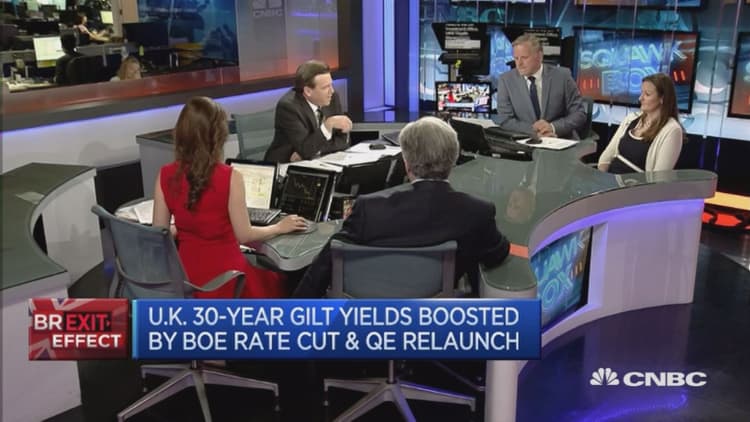
U.K. sovereign bonds have been one of the best performing assets in 2016, but this is a troubling sign, according to one market expert.
Yields on benchmark 10-year U.K. bonds — known as gilts — have slipped 1.4 percentage points since the beginning of the year, or 140 basis points. Thirty-year gilt prices have rallied and have returned around 34.3 percent year-to-date with the interest included. Yields have an inverse relationship to bond prices.
"Is this normal? Are bonds meant to return 34 percent?" Saker Nusseibeh, CEO of Hermes Investment Management, told CNBC Monday, raising concern about this kind of performance by a government bond.
The collapse in gilt yields is the result of renewed safe-haven demand, the resumption of quantitative easing and the U.K. central bank's decision to cut interest rates by a quarter of a percentage point earlier this month, according to a report by Pantheon Macroeconomics.
Nusseibeh criticized the U.K. central bank for cutting interest rates, which served to boost the prices of U.K. treasuries. "I understand why the Bank of England (BOE) did what it did. I'm not entirely convinced it boosts consumer spending, because, unlike in the continent, it's not being passed through," he said.
"The Bank of England had no alternative because there's uncertainty, but it highlights we are in an 'Alice in Wonderland' (scenario, where) gilts become like growth stocks," he added.
Is this the bottom?
With the BOE hinting that it could act again with more stimulus, analysts have been busy debating whether this is the bottom for yields.
"It is increasingly difficult … to see how gilt yields could fall much further from here," argues Samuel Tombs, chief U.K. economist for Pantheon Macroeconomics, in a report published last week.
According to Tombs, U.K. interest rates cannot move further south, as BOE Governor Mark Carney has ruled out negative rates. In addition, future rounds of quantitative easing and bond purchases by the Bank of England will prove less effective.
"The outlook for much higher inflation, mainly due to sterling's depreciation, likely will push up yields soon," Tombs said. "We expect 10-year yields to rise to 0.8 percent by the end of this year and to 2.0 percent by the end of 2017."


